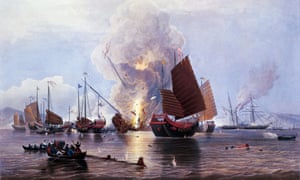
Imperial Twilight by Stephen R Platt – lessons for today from the opium war | Books | The Guardian
review by Julia Lovell
While campaigning for the US presidency, Donald Trump talked tough on China. He accused the country of “raping” the US economically: its trade policies and currency manipulation were allegedly perpetrating “one of the greatest thefts in the history of the world”. In March, Trump put his money where his mouth was, announcing up to $60bn of tariffs on Chinese imports. The US, the White House proclaimed, was “strategically defending itself” from “economic aggression”. Within hours, the People’s Republic responded by announcing its own tariffs on key US exports: pork, apples, soybeans. The rhetoric of public opinion in China was revealing of the deeper history of this trade row. Chinese editorialists promptly linked Trump’s action back to 19th-century western aggressions, and specifically to the collisions that dragged China violently into a western-dominated international world. In punishing China economically, they declared, the US was plotting to “repeat the plundering of the opium war” – a conflict Britain fought between 1839 and 1842 to protect its revenues from the opium trade and open China to British goods and influence. Parts of the Chinese cybersphere quickly resorted to militant language: “The superpower game is joined … we will block soldiers with generals and floods with dams …bring it on!”
Memories of traumatic clashes with the west and Japan during what is known as China’s “century of humiliation” (1839-1945) remain highly relevant to an ambitious, resurgent state. On the one hand it confidently sees itself as a superpower, but on the other it is suspicious that the west is trying to contain it.
No comments:
Post a Comment